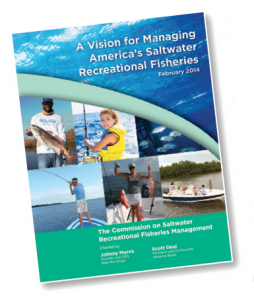April 02, 2014
By Jeff Weakley
Angling community forges recommendations or legislative updates to Magnuson Act.
 L to R: Larry McKinney, Jeff Angers (Ctr. for Coastal Conservation), Thom Dammrich (NMMA), Eileen Sobek (NMFS), Scott Deal, Johnny Morris (Bass Pro), Mike Nussman.
L to R: Larry McKinney, Jeff Angers (Ctr. for Coastal Conservation), Thom Dammrich (NMMA), Eileen Sobek (NMFS), Scott Deal, Johnny Morris (Bass Pro), Mike Nussman.
A clear, nationwide focus on how to fix many of the problems facing marine recreational fishing has come into view, summarized in a report unveiled in February. Formally released at the Miami International Boat Show, “A Vision for Managing America's Saltwater Recreational Fisheries” crystallizes the ambitions of many leaders and conservation veterans within the saltwater recreational fishing community.
The 14-page report should be an easily digestible resource, and required reading, for Congressional legislators involved in updating the Magnuson-Stevens Act.
Anglers should be aware of it, too.
The MSA took shape in the 1970s, primarily as a legislative means of consolidating marine fisheries resources into the hands of U.S. commercial fishermen. Over the years, as recreational fishing has grown, private anglers have seen mixed impacts from implementation of the MSA.
On the one hand, many fish stocks improved. On the other, conflicts of interest within regional fishery management councils effectively cemented commercial domination of allocations.
The MSA, of course, is merely the framework for how management plans are made. Things like snapper seasons, size limits for grouper, those are not contained in the MSA, but instead in Fishery Management Plans within the regional councils under the National Marine Fisheries Service.
Still, the shape of those plans is largely determined by MSA. Wording added in 2006, for instance, required Annual Catch Limits and 10-year rebuilding plans for many fish popular among recreational anglers.
The “Vision” report doesn't dig into specifics, but many of the related problems are intimately familiar to Florida anglers, and topics of regular coverage in this magazine: How to better allocate red snapper in the Gulf of Mexico, or deepwater groupers in the South Atlantic, to provide maximum socio-economic benefits. How to avoid midseason, unexpected closures on black sea bass, vermilion snapper and other fish.
As noted in the report, Florida leads the nation in economic impact of saltwater recreational fishing, with 4.8 million anglers, almost 100,000 related jobs and $11.8 billion in sales.
Scott Deal, President of Maverick Boat Company and co-chairman of the Commission on Saltwater Recreational Fisheries Management, spoke about some of the 200 jobs at the Maverick plant in Fort Pierce: “These are real jobs, good jobs, that resist offshoring.
“What we hope to achieve, spelled out in this vision statement, is a fishery management system which conserves the resources, provides consistent regulations, and delivers economic, social and conservation benefits for the nation.”

“We need to establish a national policy for recreational fishing,” added Dr. Larry McKinney, former Fisheries Director for the state of Texas, and one of the members of the Commission. “We can't manage recreational fisheries as we do commercial—which is what we're trying to do now. Recreational anglers are more focused on abundance and size structure, and opportunities to get out on the water, rather than how much money they'll get per pound of fish. There are many models managers can look at, such as how we manage spotted seatrout and redfish. Fish are more valuable than what they bring per pound.”
Listed below are summaries of recommendations forwarded by Deal, McKinney and others on the Commission on Saltwater Recreational Fisheries Management.
We took the liberty of adding some notes of our own, a localized wish-list, if you will, highlighted in blue.
We encourage you, readers of Florida Sportsman magazine, to send us your own notes, too. Send comments to Editor, 2700 S. Kanner Hwy, Stuart, FL 34994.
1) MSA should identify goals and strategies for recreational fisheries management at the local, state and federal levels.
FS: Announce secure, predictable dates for fishing seasons prior to each year—no midseason closures unless on an emergency basis. Simplify size and bag limits. Provide for more consistency between Gulf and Atlantic waters, where practical. Avoid at all costs “sector separation” or other schemes under which certain groups of anglers would be permitted to fish while others may not.
2) Manage recreational fisheries based on long-term harvest rates, not strictly on poundage-based quotas.
FS: Use catch-per-unit-of-effort for popular species such as red snapper and others for which the satisfaction of recreational anglers depends primarily on year-around availability, rather than optimizing weight of landings.
3) Develop guidelines and criteria that regional fishery management councils must consider for the allocation of all mixed sector fisheries.
FS: Fully examine the economics of re-allocating fish stocks dominated by commercial landings as a result of historical accessibility. Past landings of snowy grou- per and golden tilefish, for instance, reflect more than 90-percent commercial interest, but had the landings occurred under contemporary standards and affordability of marine electronics [see feature on sonar this month] and other fishing gear, that figure would be much different. Today, snowy grouper and golden tilefish in South Atlantic waters are re- served almost exclusively for commercial fishers.
4) Provide councils and managers greater latitude to rebuild stocks in a timely and reasonable manner.
FS: If a fishery is showing a positive in- crease in SPR and/or CPUE (as was the case with red snapper in South Atlantic waters from the late 1990s forward), weigh the consequences of season closures or other regulatory changes for the sportfishing sector before affixing a hard time frame for accelerating growth of said stock.
5) Determine on a stock-by-stock basis which management entities are most appropriate and capable of successfully managing the stock.
FS: The Florida Fish and Wildlife Conservation Commission should take the lead for yellowtail snapper, black grouper, Gulf of Mexico red grouper and other non-migratory species whose landings occur primarily in Florida waters.
6) Incorporate forage-base manage- ment to provide optimal health, reproduction and growth in important predator stocks.
FS: To some degree, the federal councils are already on track with this one: Minimizing bycatch of small fish in shrimp trawls. Formulating annual catch limits
for small, yet marketable, fish such as blue runner.
To this list of recommendations, Florida anglers would no doubt like to see Congressional language guiding fishery managers away from closures of general public fishing without first addressing large commercial catches. That includes temporal closures (for instance red snapper seasons in Gulf of Mexico waters) as well as spatial closures (Dry Tortugas National Park, proposed Biscayne Bay closure, and other MPAs).
Resolving obstacles to citizens' full enjoyment of saltwater fishing in U.S. waters would have broad implications for marine conservation and the national economy.
“Each year, marine recreational fishermen spend $1.5 billion in licensing, excise taxes and donations into fisheries conservation. That's larger than the appropriated budgets for the National Marine Fisheries Service and U.S. Fish and Wildlife Service,” said Mike Nussman, President of the American Sportfishing Association.
And that's just the icing on top of an economic cake in which the spending behavior of anglers in states like Florida and California, according to NMFS data, account for $70 billion in economic output annually.
